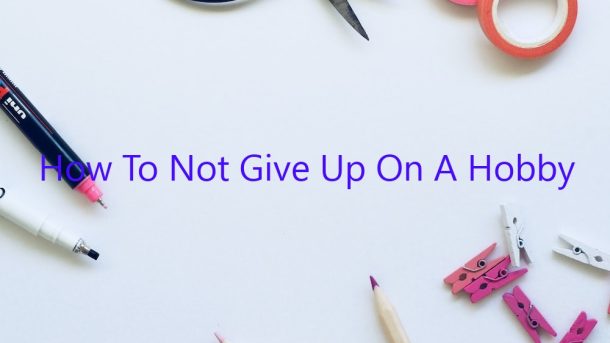In a world that is constantly moving and always evolving, it can be hard to stick to any one thing for too long. From our jobs to our relationships, it seems like everything is always in a state of flux. It can be really hard to dedicate yourself to something that might not be around in a few months or years.
This is especially true for hobbies. We all have them – those activities that we enjoy doing in our spare time, that make us feel good. But sometimes, it feels like we can’t keep up with them. We get busy with work or school, and our hobbies fall to the wayside. We convince ourselves that we’ll pick them back up “later”, but that “later” never seems to come.
So how can we make sure that we don’t give up on our hobbies? Here are a few tips:
1. Make time for your hobby.
This may seem like a no-brainer, but it’s actually really hard to fit hobbies into our busy lives. We’re so used to filling every spare moment with work or school or other commitments that finding time for something we enjoy can be a challenge.
But if you really want to keep up your hobby, you need to make time for it. Try to schedule it in your calendar like you would any other appointment. This way, you’ll be less likely to forget about it and more likely to make time for it.
2. Set realistic goals.
One of the reasons we often give up on our hobbies is because we set ourselves up for failure. We tell ourselves that we’re going to practice for three hours every day or that we’re going to write a novel in six months. When we inevitably can’t meet these goals, we give up on our hobby altogether.
Instead, try setting realistic goals. Tell yourself that you’re going to practice for an hour every day or that you’re going to write a page a day. These goals are more achievable, and as a result, you’re less likely to give up on your hobby.
3. Find a hobby buddy.
Hobbies can be really lonely activities. We often do them by ourselves, in our own time, without talking to anyone. This can make them really unenjoyable and eventually lead to us giving up on them.
But if we have a hobby buddy, someone to do our hobby with, it can make it a lot more fun. We can talk to each other about what we’re doing, give each other feedback, and just enjoy each other’s company.
4. Set a deadline.
If you’re having trouble sticking to your goals, try setting a deadline. This can be especially helpful for projects, like writing a novel. Tell yourself that you’re going to finish the novel by a certain date, and as a result, you’ll be more likely to work hard to meet that deadline.
5. Reward yourself.
When we meet our goals, we should reward ourselves. This is a great way to keep up our motivation and make sure that we don’t give up on our hobbies. After all, if we’re not getting any satisfaction from our hobbies, we’re more likely to stop doing them.
So find a way to reward yourself for meeting your goals. This could be something as simple as buying yourself a new book or taking yourself out to dinner. Whatever it is,
Contents [hide]
How do I keep a hobby going?
There are many things to consider when it comes to keeping a hobby going. It can be difficult to maintain the same level of excitement and motivation that you felt when you first started the hobby. Here are a few tips on how to keep your hobby going:
-Set realistic goals for yourself. Don’t try to accomplish too much at once. Spread out your goals and try to achieve one or two per month. This will help keep you motivated and on track.
-Make a schedule and stick to it. Dedicate a specific day and time each week to your hobby. This will help you stay organized and on track.
-Join a group or online forum related to your hobby. This can be a great way to meet new people with similar interests, and to get advice and feedback from others.
-Take a class or workshop related to your hobby. This can help you learn new techniques and expand your knowledge.
-Set a budget and stick to it. This will help you avoid overspending on materials or equipment associated with your hobby.
-Take breaks. Don’t try to work on your hobby every single day. Give yourself time to relax and recharge.
How do you know when to give up on your hobby?
Everyone has a hobby. Whether it’s painting, hiking, playing video games or some other activity, hobbies give people a way to enjoy themselves and relax. However, there may come a time when you need to give up on your hobby. Here’s how to know when it’s time.
The first sign that it might be time to give up on your hobby is if it’s no longer enjoyable. If you used to love hiking but now find it to be a chore, then it might be time to move on. Hobbies should be something that you enjoy, not something that you feel obligated to do.
Another sign that it might be time to give up your hobby is if it’s no longer making you happy. If you used to love painting but now feel frustrated and overwhelmed every time you try to paint, then it might be time to find a new hobby. Happiness should be one of the main goals of your hobby, so if it’s no longer providing that, it’s time to find something new.
If you’re constantly struggling to find time for your hobby, that might be another sign that it’s time to move on. If you’re always feeling rushed and stressed, it’s probably not the right hobby for you. You should be able to fit your hobby into your schedule without too much trouble, otherwise it’s not worth your time.
Finally, if your hobby is causing you problems or making you unhappy, it’s probably time to give it up. If you’re constantly arguing with your friends and family about your hobby, or if it’s causing you financial problems, it’s probably not worth the hassle. Your hobby should make you happy, not stressed out and angry.
If you’re having trouble deciding whether or not to give up on your hobby, ask yourself these questions. If the answer is no to most of them, it might be time to find a new activity to enjoy.
Why do people give up their hobbies?
There are many reasons why people might give up their hobbies. For some, it might be because they no longer have the time to devote to their hobby. For others, it might be because they no longer find the hobby enjoyable. And for still others, it might be because they no longer feel that they are getting anything out of the hobby.
One of the main reasons why people might give up their hobbies is because they no longer have the time to devote to them. This might be because they are too busy at work, or because they have children who need their attention. As a result, they may find that they no longer have the time or energy to engage in their hobby.
Another reason why people might give up their hobbies is because they no longer find them enjoyable. This might be because they have done the same thing over and over again, and they are no longer interested in it. Or it might be because they are no longer meeting new people through their hobby. As a result, they may find that they no longer enjoy doing it.
Finally, some people might give up their hobbies because they no longer feel that they are getting anything out of them. This might be because they are no longer learning new things, or because they are no longer challenging themselves. As a result, they may find that they no longer have any reason to continue doing their hobby.
So, there are a few reasons why people might give up their hobbies. In most cases, it is because they no longer have the time or energy to devote to them, or because they no longer find them enjoyable. However, it can also be because they no longer feel that they are getting anything out of them.
Why did I stop doing my hobbies?
It’s a question that a lot of people ask themselves at some point – why did I stop doing my hobbies? For a lot of people, hobbies are a valuable source of relaxation and self-expression, so it can be frustrating when we find ourselves no longer enjoying them. So, what’s the reason for this change?
There can be a lot of different reasons why someone might stop doing their hobbies. Sometimes, it might be because we’ve lost interest in the hobby itself. This might be because we’ve done it so many times that it’s no longer fun, or because we’ve outgrown it and are looking for new challenges. Alternatively, it might be that our lifestyle has changed and we no longer have the time or opportunity to pursue our hobbies. This can be especially common for people who have young children, as they often have less free time than they did before having a family.
Job demands can also be a factor – if we’re constantly working long hours, we might not have the energy or inclination to do anything else when we get home. Alternatively, we might be dealing with personal problems that are preventing us from enjoying our hobbies. Whatever the reason, it’s important to remember that there’s no shame in stopping doing a hobby that we’re no longer enjoying.
If we’ve lost interest in our hobby, there’s no harm in simply stopping doing it. In fact, this can sometimes be the best thing for us, as it can free up our time and energy to pursue other interests. If we’re dealing with personal problems, it might be a good idea to talk to someone about them, as this can help us to find a solution. And if job demands are the reason we’ve stopped doing our hobby, it might be worth trying to find a way to balance our work and personal life more effectively.
Whatever the reason, it’s important to remember that there’s no shame in stopping doing a hobby that we’re no longer enjoying. If we’re feeling down about ourselves because we’ve stopped doing our hobbies, it might be a good idea to talk to a therapist, who can help us to address any underlying issues.
What are the 5 hobbies everyone should have?
There are countless hobbies to choose from, but some are more popular than others. Here are five hobbies that everyone should have:
1. Reading
Reading is a great way to improve your knowledge and vocabulary. It can also be a form of escape, providing an opportunity to lose yourself in a good book.
2. Gardening
Gardening is a great way to get some exercise and fresh air, while also enjoying the fruits of your labour.
3. Painting
Painting is a great way to express yourself and to relax. It can also be a great way to improve your artistic skills.
4. Cooking
Cooking is a great way to learn about different cuisines and to improve your culinary skills. It can also be a fun way to spend time with friends and family.
5. Playing a musical instrument
Playing a musical instrument is a great way to improve your musical skills and to have fun. It can also be a great way to relax and to de-stress.
How long does the average hobby last?
How long does the average hobby last?
There is no definitive answer to this question as the length of time a hobby lasts can vary greatly from person to person. However, according to a study carried out by the University of Utah, the average hobby lasts around 3.5 years.
There are a number of factors that can influence how long a hobby lasts, such as how much enjoyment the person gets from it and how much time they have to devote to it. Some hobbies can also be quite expensive, which can lead to people eventually losing interest in them.
There are a number of things people can do to prolong the life of their hobby. One of the most important things is to make sure that they continue to enjoy it. If they start to feel like they’re doing it just for the sake of it, they may find it harder to keep motivated.
People should also try to find ways to fit their hobby into their busy schedule. This may mean sacrificing some of their free time, but it can be worth it in the long run.
Finally, it’s important to be realistic about how much time and money can be realistically devoted to a hobby. If people start to feel like they’re not getting enough out of it, they may find that it’s time to move on.
How do I motivate myself to get my hobby back?
How do I motivate myself to get my hobby back?
Motivation is key to getting anything done, especially when it comes to getting your hobby back. Here are a few tips to help motivate yourself:
Set realistic goals. Don’t try to overhaul your entire hobby in one day. Set small, achievable goals to help get you started.
Make a plan. Once you have your goals set, make a plan of action to achieve them. This will help keep you on track.
Find a support group. Whether it’s friends, family, or a online forum, find people who can support your hobby goals.
Find inspiration. Look for inspiration in other people, places, or things to keep you motivated.
Reward yourself. Celebrate each small accomplishment with a treat or special activity.
Most importantly, don’t be too hard on yourself. Everyone has off days, and that’s OK. Just keep trying, and eventually you’ll get there.




